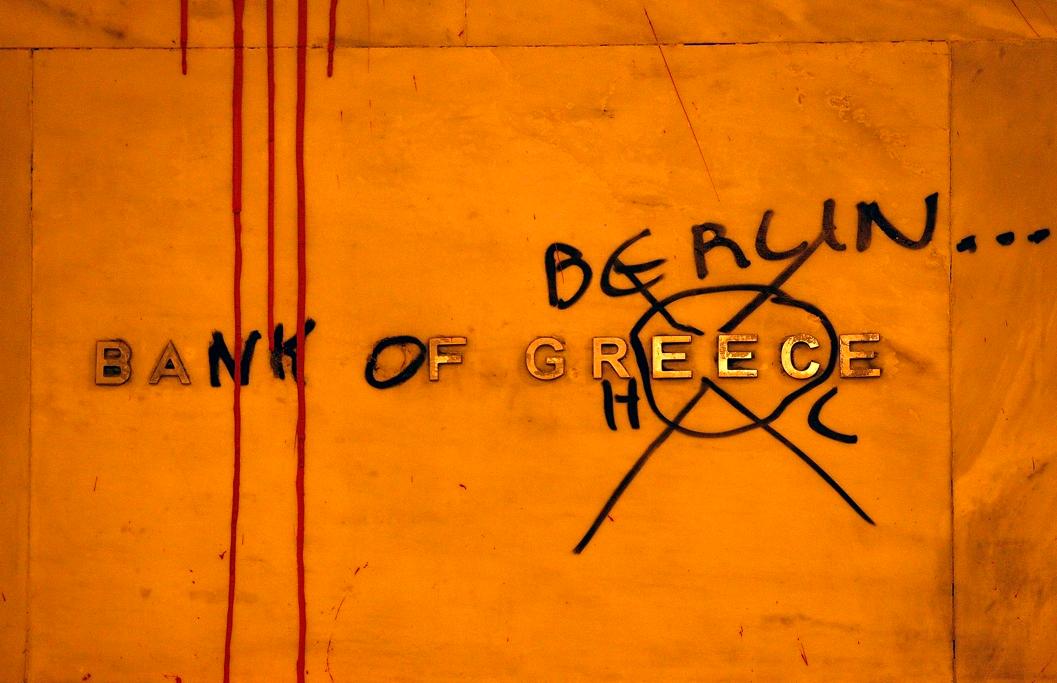Are Greece’s days in the euro zone numbered?
Graffiti during a protest in Athens earlier this year.
BRUSSELS — Voters in France and Greece threatened to check the austerity drive designed to fix Europe's debt crisis, but it's the results from Athens that risk dealing the biggest blow to the euro zone's future.
With a modicum of goodwill, the new French President-elect Francois Hollande and German Chancellor Angela Merkel should be able to bridge their much-publicized differences over the balance between austerity and growth.
Both are mature, mainstream politicians, aware of what's at stake should they fail to quickly build a new Franco-German partnership to steer the euro zone through this crisis.
But it’s hard to see anything but chaos emerging from the success of the ragbag of communists, neo-Nazis and other former fringe groups who surged into the Greek parliament in Sunday's election.
Already, even the humiliated mainstream parties are demanding a renegotiation of Greece's 130 billion euro bailout from the European Union and International Monetary Fund.
Read more: GlobalPost's most recent coverage of the debt crisis
Elsewhere in Europe, patience with Greece has long been wearing thin. It’s unlikely that Merkel or other European leaders will agree to significantly ease the bailout terms they set in February after months of painstaking negotiations.
Unless fragmented Greek politicians can stitch together an unlikely compromise, the real prospect of Greece being forced out of the euro zone will again loom large.
"Francois Hollande's victory in the presidential election marks the beginning of a change in Europe, but we are worried about Greece," said Hannes Swoboda, leader of the socialist group in the European Parliament. "The results of the Greek elections … ring out as a warning."
Rather than giving impetus to the tentative pro-growth approach which has been emerging in Europe in recent weeks, Hollande may find himself joining other European leaders obliged to concentrate on convincing markets that a political and economic meltdown in Greece can be contained and not spread to Portugal, Spain, Italy or beyond.
Portgal's government moved into overdrive Monday to distance itself from the uncertainty in Greece.
"In Portugal we have a majority government that guarantees stabilty," Foreign Minister Paulo Portas told reporters in Lisbon. "The Portuguese have always gone for moderate options and have never sympathised with extremism. This is positive — it underlines how Portugal is different."
The crisis in Athens could come to a head within weeks. Whatever new government emerges is due to agree on billions in new budget cuts next month. If it fails, international creditors could withhold bailout money, edging the country toward bankruptcy.
"With the outcome of the election, to us the probability of a Greek exit (from the euro zone) is now larger than our previous estimate of 50 percent, and rises to between 50-75 percent," warned a report Monday from Citi Group economists.
Read more: How Hollande's election impacts the crisis
The conservative New Democracy party and its socialist rival PASOK have alternated in power since Greece emerged from dictatorship in the 1970s. On Sunday, the two parties that agreed to the bailout package shared less than a third of the vote. Although his party came top with 18.9 percent, New Democracy leader Antonis Samaras said Monday he was unable to form a coalition.
Most Greeks voted for an array of small groups from the right- and left-wing extremes who are radically opposed to the foreign-imposed debt-reduction measures.
"Those who betray this country — it's time for them to be afraid," railed an exultant Nikolaos Michaloliakos, leader of the Nazi-inspired Golden Dawn movement, which won 7 percent of the vote. "We will fight to free Greece from the global loan sharks."
In response to the election results, the Greek stock exchange plummeted Monday, and the euro slumped to its lowest level in months. From Berlin, Merkel told the Greeks it was of the "utmost importance" that they stick to the austerity path, while EU officials in Brussels warned that the Greeks "must carry out their responsibility" in order to stay in the euro.
Hollande is expected to travel to Berlin shortly after his inauguration next Tuesday for crisis talks with Merkel. Although she once offered to campaign for his defeated rival Nicolas Sarkozy, Merkel on Monday said, "Germany will welcome Francois Hollande with open arms, and then we will work together."
Read more: Why Germans still love Angela Merkel
However, she again rejected the French socialist’s demand for a re-negotiation of the fiscal treaty, which commits euro zone nations to budget discipline and is the centerpiece of Germany's plan to tackle the debt crisis.
Despite their public differences, officials from both countries and at EU headquarters in Brussels have hinted a compromise is possible, which would leave the fiscal pact intact, but add a commitment to boost growth in some sort of annex.
It may not be easy. Opposition to anything that smacks of backsliding by the southern Europeans, or involves German taxpayers reaching further into their pockets, is strong in Germany, not least among Merkel's allies in the Free Democratic Party who scored well in a regional election on Sunday.
However, Merkel has already suggested she could live with some of the pro-growth measures outlined by Hollande — such as boosting the firepower of EU's investment bank, or fast-tracking the disbursement of European development funding. The hope is that relatively little public money could leverage private funds and pump up to 200 billion euros into struggling southern European economies.
Read more: Greek voters vent their rage at the ballot box
Merkel has long been warned that the draconian levels of austerity imposed on Greece and other nations risked undermining the democratic mainstream and fuelling extremism.
Hollande's arrival on the scene raises hopes that pro-growth policies could ease the pain, but many are asking if he hasn't come too late to save Greece from bankruptcy and ejection from the euro zone.
